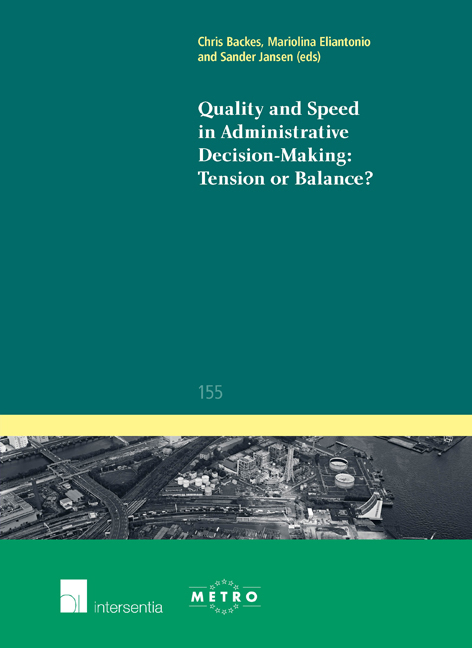Book contents
- Frontmatter
- Contents
- List of Authors
- List of Abbreviations
- Introduction
- Quality and Speed in Administrative Decision-Making: A German Case Study
- The Quest for Quality and Speed in Italian Administrative Law Or the Tale of some Elusive Targets
- Quality and Speed in Administrative Decision-Making: A French Case Study
- Planning for Major Infrastructure in England: Front-Loading Participation in the Interests of Efficiency
- Quality and speed in Judicial Procedures and Administrative Decision-Making: Environmental Permits in Sweden
- Faster and Better!? Decision-Making in the Netherlands
- Conclusions
- Ius Commune Europaeum
Faster and Better!? Decision-Making in the Netherlands
Published online by Cambridge University Press: 12 December 2017
- Frontmatter
- Contents
- List of Authors
- List of Abbreviations
- Introduction
- Quality and Speed in Administrative Decision-Making: A German Case Study
- The Quest for Quality and Speed in Italian Administrative Law Or the Tale of some Elusive Targets
- Quality and Speed in Administrative Decision-Making: A French Case Study
- Planning for Major Infrastructure in England: Front-Loading Participation in the Interests of Efficiency
- Quality and speed in Judicial Procedures and Administrative Decision-Making: Environmental Permits in Sweden
- Faster and Better!? Decision-Making in the Netherlands
- Conclusions
- Ius Commune Europaeum
Summary
Introduction
Over the last decade, faster (and better) decision-making has been a hot topic in discussions about the improvement of administrative law and government policy in the Netherlands. Whilst administrative lawyers were proud of the coming into force of the first General Administrative Law Act (GALA) in 1994, politicians had a more critical view on the functioning and effectiveness of the law governing the administration. They felt that their plans and actions were hampered by complex laws, by judges who over-scrutinized and were much too critical and by citizens who objected to plans devised by the administration much too often. There was a feeling that ‘almost nothing can be done any more’ because of difficult procedures, detailed rules and intensive but ineffective judicial review: this culminated in a report in 1997 of a ‘taskforce reducing juridification of the public administration’, the so-called ‘taskforce Van Kemenade’. The report was commented on by many who argued that the analysis and argumentation was partial. Nevertheless it had a great impact, sparking a broad discussion about the functioning of administrative law, especially of the procedural rules and judicial review.
The next triggers for the discussion on speeding up decision-making were the EU environmental directives, especially the directive on air quality standards (Directive 1996/61/EC). In 2005 stringent binding quality standards for particulate matter and NOx came into force. The air quality in many parts of Europe (Italy, France, Belgium, UK, Germany, the Netherlands) did not comply with these standards. As a consequence, Dutch judges prohibited any activity that would cause a little extra pollution of the air quality in places where the quality standards were not met, which at that time was nearly everywhere in the Netherlands. New housing areas, motorways, football stadiums and industrial sites could not be built.
The interesting thing was that this only happened in the Netherlands and not in any of the other countries which did not meet the air quality standards.
- Type
- Chapter
- Information
- Publisher: IntersentiaPrint publication year: 2016

